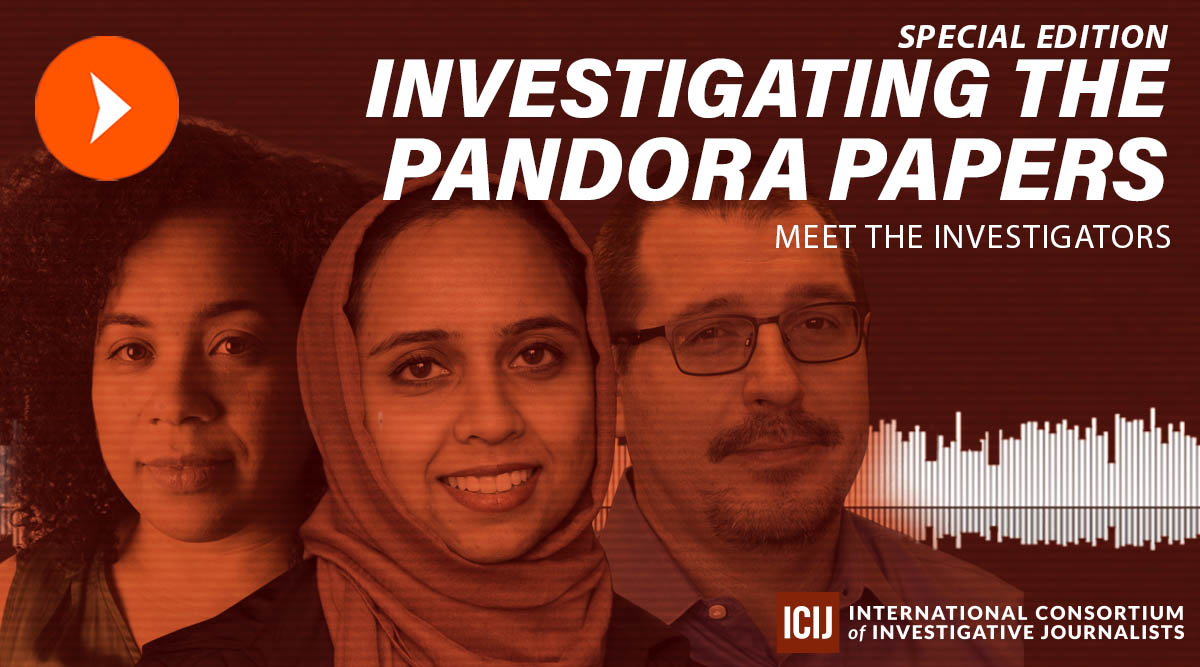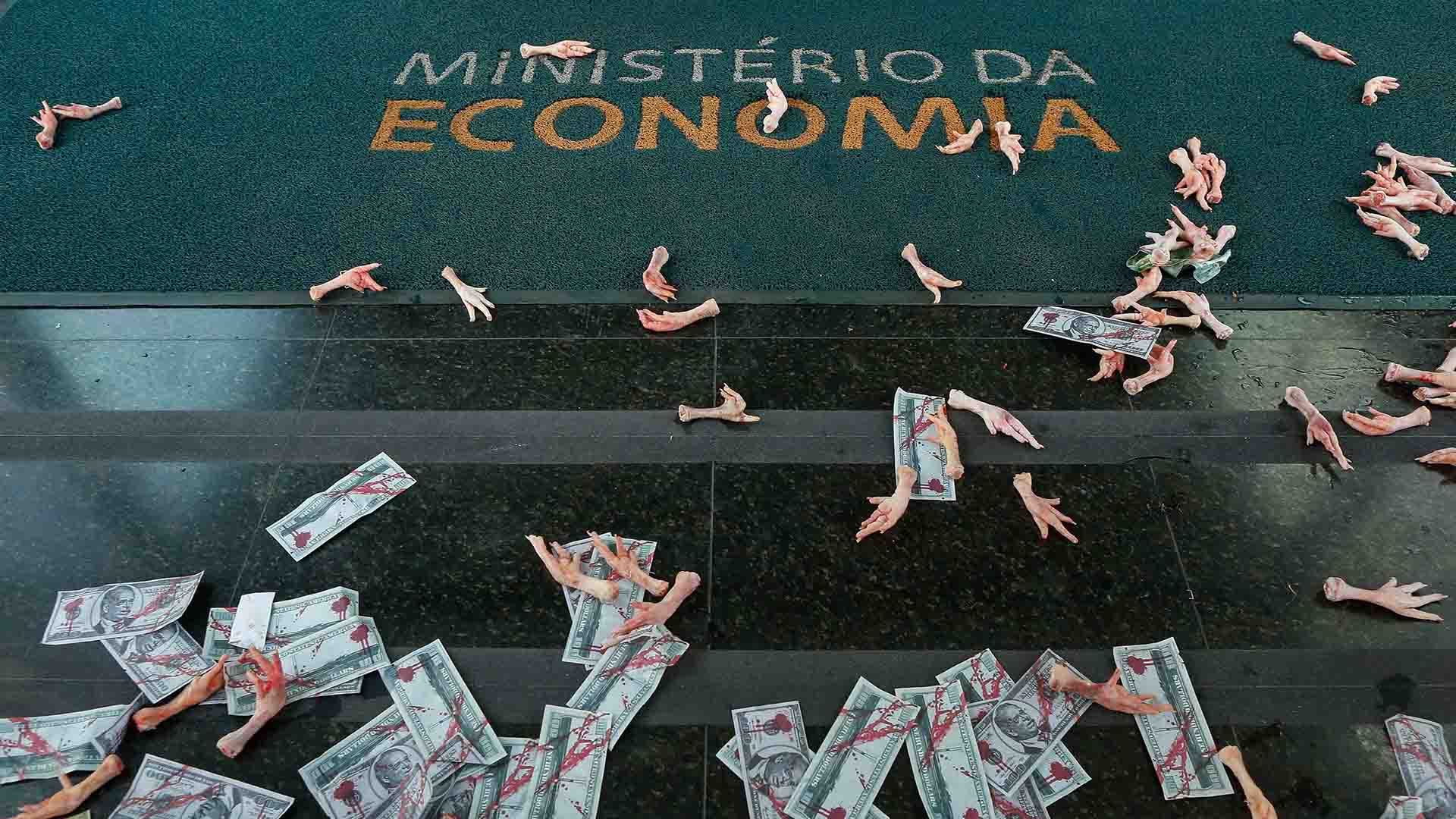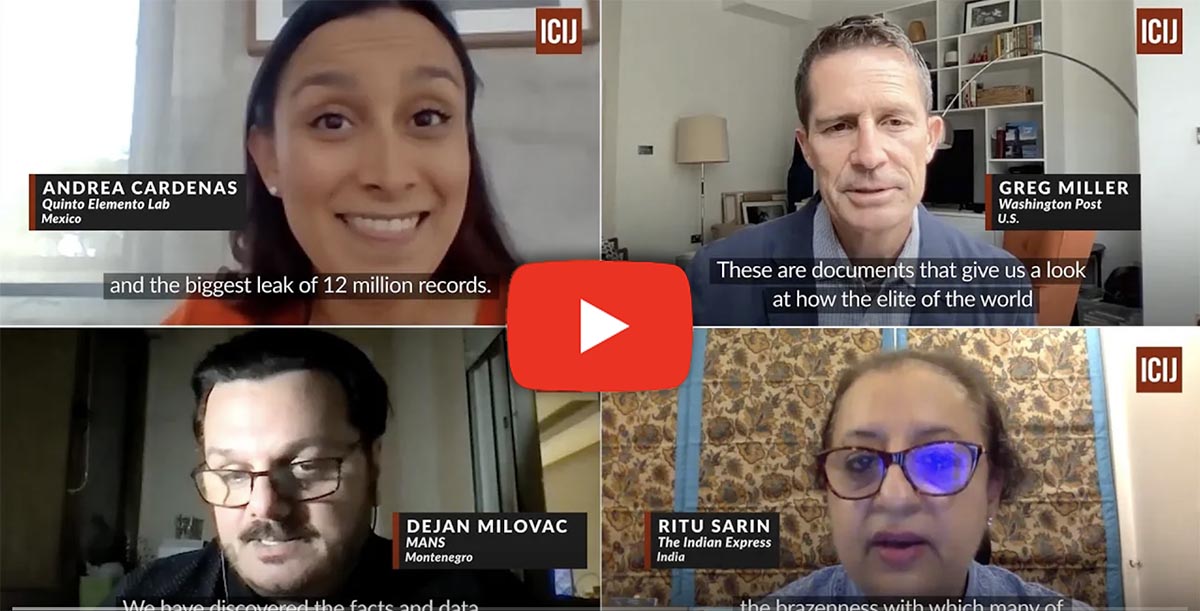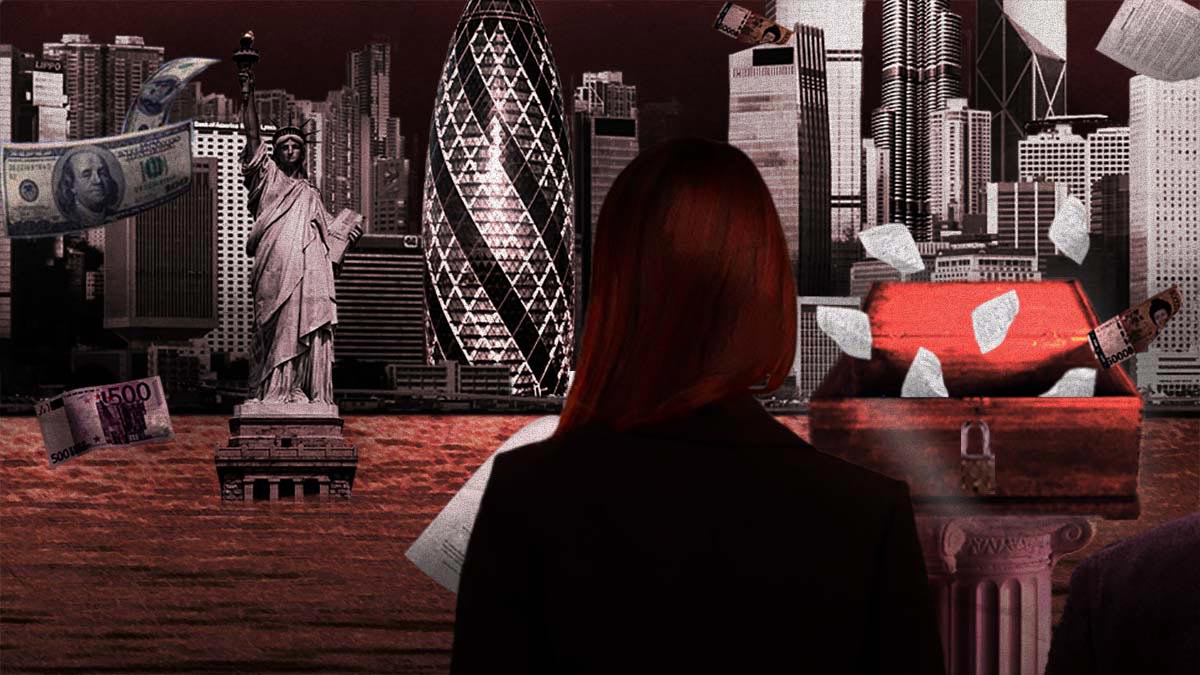The International Consortium of Investigative Journalists collaborates with hundreds of members across the world. Each of these journalists is among the best in his or her country and many have won national and global awards. Our monthly series, Meet the Investigators, highlights the work of these tireless journalists.
In this special edition of our podcast, ICIJ’s own journalists Asraa Mustufa, Brenda Medina and Agustin Armendariz shared insights and stories from behind the scenes of our biggest investigation ever — the Pandora Papers.
Please note, this podcast episode was recorded and edited in early November.
Sean McGoey: Welcome back to the “Meet the Investigators” podcast, from the International Consortium of Investigative Journalists. I’m your host, Sean McGoey, and I’m an editorial fellow here at ICIJ.
It’s been about a month since the first stories from ICIJ’s latest investigation were published. The “Pandora Papers” is based on nearly 12 million documents that continue to shine a light on the shadowy offshore financial system that benefits the wealthy and powerful at the expense of the larger public.
The Pandora Papers is ICIJ’s widest-ranging investigation ever, with documents coming from 14 different law firms and trust specialists that facilitate the creation of offshore shell companies.
It’s also the largest journalism collaboration ever. Over nearly two years, more than 600 reporters from news outlets spanning 117 countries shared research findings and worked together on stories about wealthy businessmen, criminal kingpins, and political power brokers.
I’m here to discuss the Pandora Papers with ICIJ reporter Brenda Medina …
Brenda Medina: Hello, this is Brenda.
Sean: … Asraa Mustufa, ICIJ’s digital editor …
Asraa Mustufa: Hi, I’m Asraa.
Sean: … and Agustin Armendariz, senior data reporter at ICIJ.
Augie Armendariz: Hi, this is Augie.
Sean: Thanks to all of you for being here!
One of the things that has stuck with me as I’ve watched the Pandora Papers stories roll out is something that ICIJ’s director, Gerard Ryle, has said several times. I don’t think I can say it much better than he did, so let’s hear it directly from him:
[Audio clip] Gerard Ryle: We’re talking about some of the most famous people in the world that are in these documents — presidents, prime ministers, government ministers.
I guess it mostly demonstrates that the people who could end the secrecy of offshore — could end what’s going on — are themselves benefiting from it. So there’s no incentive for them to end it.
We’re looking at a system here that is harming people. It’s harming the world. And it’s important that people know about it.
Sean: ICIJ was able to confirm offshore holdings for nearly three dozen current and former country leaders, including the family of a Kenyan president who has campaigned against corruption and a Czech prime minister whose party suffered surprise election losses after it was revealed that he hid his ownership of a lavish French Riviera estate behind a network of shell companies.
And [recently], we saw the latest fallout from Pandora Papers reporting: The lower house of Chile’s legislature voted to impeach President Sebastian Piñera over allegations of corruption based on revelations found in the leaked documents. That vote moves the proceedings to the Senate, where the opposition party is not expected to have enough support to remove him from office.
Brenda, can you tell me a little bit about what happened with the mining company owned by Piñera’s family?
Brenda: Piñera is the fourth richest person in Chile and he is worth more than $2 billion, according to some estimates. Over the years he has transferred a lot of his fortune to his children, who now run the family’s businesses.
In 2009, as Piñera ran for president, his children became majority owners of a mining company. Another owner was Piñera’s close friend from childhood. About 9 months into Piñera’s presidency, in December 2010, his children sold their part of the mining company to Piñera’s friend for $138 million. The deal was done using shell companies in the British Virgin Islands, and the plan was to make the payments in three installments.
Our partners at the Chilean Center for Investigative Reporting (CIPER) and an outlet called LaBot found the contract for that deal in the Pandora Papers. What they revealed is that the contract includes a clause saying the third payment would not be made if the area where the mine was supposed to be built was declared environmentally protected.
This wasn’t a far-fetched possibility, because the mining project is planned in an area that’s very environmentally sensitive. Scientists actually call it a biodiversity hotspot.
Sean: So a provision in the contract hinged on decisions made by Piñera’s government. That sounds like a pretty textbook conflict of interest, right?
Brenda: Exactly. I think that this case is the prime example of why this kind of information is of public interest.
Sean: Asraa, what kind of message does it send that people who hold political power around the world are using shell companies and trusts in secrecy jurisdictions?
They could push reforms to put a stop to the harms that come out of the offshore system. But again and again, we kept seeing that powerful politicians are themselves taking advantage of the financial secrecy — Asraa Mustufa
Asraa: By showing that politicians across the world, from all over the political spectrum, are using this system over decades, it really captures how this is an economy that serves global elites — where they’re able to play by different rules and escape scrutiny in jurisdictions where they don’t live, they don’t make their money, they probably haven’t even physically been to. It says something about the hidden architecture of this widening global inequality we’re all seeing and experiencing.
They set the public agenda. They could push reforms to put a stop to the harms that come out of the offshore system. But again and again, we kept seeing that powerful politicians are themselves taking advantage of the financial secrecy that this world has to offer.
These are officials that are entrusted with public functions, so they’re also positioned to participate in bribery or corruption if they wanted to. So their financial dealings are more inherently in the public interest than [those] of a private citizen. That’s why we focused the majority of our efforts on understanding what politicians, specifically, are doing offshore.
Sean: The largest contingent of politicians in the Pandora Papers data comes from Latin America and the Caribbean, including 14 of the heads of state that we profiled as Power Players.
Brenda: We found several current and former Latin American presidents linked to offshore entities, including the current presidents of Ecuador, Chile and the Dominican Republic. Each case is different, but one trend I noticed is that many of these power players are empresarios, or businessmen, before becoming presidents. So they are familiar with the offshore system. In fact, many of them have owned offshore companies for years, before they were elected. And I should say that owning or being linked to an offshore entity isn’t necessarily illegal, but they are certainly looking for some kind of benefit, right?
And what many of these jurisdictions offer is low or no taxes and secrecy. And we see that people in public positions have taken advantage of that secrecy. We found that public officials involved in corruption scandals in Latin America used offshore companies to control the bank accounts where they deposited the ill-gotten money.
Sean: There’s something else many of those figures have in common: the law firm of Alemán, Cordero, Galindo & Lee, also known as Alcogal.
Alcogal is, somewhat famously, not the first Panamanian law firm to find itself at the center of an ICIJ investigation — of course, that would be Mossack Fonseca, whose leaked records were the foundation of the Panama Papers.
But Alcogal is one of the major sources of the data in the Pandora Papers, and nearly half the politicians we identified used the firm as their offshore services provider — not just in Latin America, but all over the world.
Brenda: Firms like Alcogal are the facilitators of this industry, and Alcogal seems to attract members of the business and political elites from everywhere — presidents, government ministers, billionaires, soccer stars, you name it.
This firm was established in 1985 by four attorneys who were young and hungry and willing to take certain risks. They started working out of a small office in Panama City and now their firm operates on five continents. These attorneys are well-connected because they are themselves rooted in the political class they serve. One partner was ambassador to the U.S., and others have been government ministers, judges and presidential advisors.
Over the past three decades, Alcogal has created thousands of shell companies, mainly in the BVI and Panama. Sometimes they did it directly for the client, but in many cases, they did it at the request of banks who serve as intermediaries for wealthy clients.
Sean: Going back to something you mentioned before, why is it so important that firms like Alcogal act as intermediaries, playing this facilitator role?
Brenda: They are the gatekeepers. It’s important to remember that in many jurisdictions, a person interested in creating an offshore entity has to use the services of a registered agent. In Panama, a millionaire cannot just walk into a government office and say, “I’m here to create a company or a private interest foundation.” By law, a Panamanian attorney has to register the company for them. In the British Virgin Islands, they would need a licensed registered agent to do it.
Even in the leaked documents, I saw training materials by Alcogal that said things like “It is crucial for our employees to know they are the first line of defense in the efforts to prevent and detect money laundering and terrorism financing.” This tells us that, at least on paper, they understand their role.
They have to know who they are setting up companies for. If the person is a public official, or a politician or a relative of political people, the firms should investigate them further — and they have the right to turn down potential clients. Yet we see bad actors getting through the gates these offshore services providers are supposed to be guarding.
What we and many of our partners found is that some of the companies set up by Alcogal have been used to move money in some of the biggest corruption scandals in Latin America: the Odebrecht bribery scheme, illegal commissions paid for the purchase of weapons in Peru under the Fujimori government, and the alleged looting of Venezuela’s national oil company.
Sean: It definitely makes you stop and do a double take when you see documents that indicate that these firms know they have certain responsibilities, and they may or may not always be fulfilling them to the best of their ability.
Brenda: Yes. One of Alcogal’s founders, Jaime Alemán, wrote a memoir titled “Honesty is Priceless.” In the book, he explains that sociedades anónimas, or limited stock companies, allow clients to secretly operate bank accounts in places like Switzerland or Luxembourg while dodging taxes in their own countries.
He called setting up these companies a “wonderful business” that has existed in Panama for nearly a century, and helped his father and other attorneys make a fortune by collecting fees for setting up these companies and helping mask the identities of the real owners.
Sean: Something that I’ve noticed not just on the Pandora Papers, but in going back and reading the work from previous ICIJ investigations, is that for a system where secrecy is the first priority, these offshore structures generate an awful lot of paperwork. Even though the dataset that ICIJ was working with spans several decades, the sheer thought of 12 million documents still makes my head spin a little bit.
Augie, how do you even begin to sift through all that data? Obviously there are technical and technological components to making that happen, but I’m interested in how you wrap your brain around it all.
Augie: I think the secret sauce is the collaboration, especially with our reporting partners all around the globe. We worked with a globally distributed network of 600 reporters who bring their own knowledge and expertise to the work — and who knows what’s going on in a country better than the people who report from that country every single day?
Sean: It also seems to me like the ICIJ data team steps in and helps facilitate when there are areas where interest bridges across countries [or] across regions. Can you talk a little bit about that?
Augie: A big part of the work on the Pandora Papers was trying to aid and amplify the work of the group by consolidating and organizing lists of names found in the data — it’s very useful to have a compiled list of all of the offshore companies associated with a particular country, for example, and the beneficial owners of those companies.
We ran searches on all kinds of lists: sanctioned individuals and companies, the Forbes billionaires list, private equity fund names, politicians, things like that. Those searches often return more results than we have the resources to pursue, and investigative projects in general are heartbreaking because of all the things that don’t get turned into a story — because you can only do so much.
But with a whole team moving in the same direction and radically sharing their findings, a whole lot less gets left on the cutting room floor in the end, which is very, very satisfying.
Sean: This massive data dive resulted in ICIJ identifying more than 330 politicians who had direct roles with offshore companies. But building that list took more than just database searches and reporting. It also required a pretty gargantuan fact-checking effort — after all, if you’re going to report that a politician named John Smith registered a company in Panama, you better be sure not only that the company exists, but that the John Smith you’re talking about is, in fact, the politician.
Augie, what are the thoughts that go through your head when you’ve been at it for several hours and then you look and see that you still have something like 15 more names to check?
Augie: It’s like a mental power drill. Investigative reporting is not glamorous, it’s not sexy. It’s dealing with tons and tons of details that you have to fit together correctly, and it’s tiring work. Having a team like this where we can all kind of commiserate with each other and keep a positive attitude helps, but yeah, it’s a lot of work.
Sean: It is a little bit like putting together a 50,000-piece jigsaw puzzle from afar — on deadline.
Asraa, how did we then take that list of 330+ and narrow it down to the group that became known as the Power Players?
Asraa: It was a really complex, ongoing discussion across the team: Who among these hundreds of politicians are the most powerful, influential, and newsworthy? Because as Augie was saying, we don’t have the resources to dig into every single one.
So the first cut was heads of state: presidents, prime ministers, royals with power, or their immediate associates and proxies. These are the most well-known names. They show the heights of political power engaging with this system. After that, our reporting partners in different countries, they also serve as on-the-ground local experts. We’re consulting with them: “Who’s a big deal in your country? What are you most excited about?”
After all those discussions, there’s still way too many good options! So at ICIJ, we wanted to make sure we had representation across all the continents. So in the end, we ended up with 35 current and former world leaders, and we also managed to profile about two dozen additional politicians in [ICIJ’s] Power Players interactive.
It was a really big undertaking! But it does a good job conveying the scope of the data, which spans several decades, and shows how enduring the offshore system has been as a go-to for leaders across administrations and across social and political tides.
Sean: The Pandora Papers is a project that contains multitudes. There are stories about country leaders like Sebastian Piñera, entertainers and athletes who route their endorsement income through tax havens, and even a disgraced Catholic order that owns real estate across the United States. Asraa, what’s the common thread that ties all of this reporting together?
Asraa: Many of the questionable activities you see in the Pandora Papers data [are] probably legal, and that’s actually part of the scandal here. The firms involved are experts at crafting financial structures or designing and exploiting loopholes in ways that wouldn’t necessarily get their clients in legal trouble even if it did ever come to light.
But I think the question that ICIJ is interested in exploring in this and other offshore investigations is “Whether it’s legal or not, is it ethical?” Because if the net effect of this system drastically affects public life — by depriving governments of huge amounts of tax revenue, for example — is it fair for it all to be kept secret?
There’s a lot of figures [in the data] from countries that don’t have democratic processes to hold those politicians accountable, but in those cases, we felt it was equally important to bring them to light, because the documents provide a rare window for citizens in those countries to see what their rulers are doing with their money.
In many of those places, that kind of information is not only barely available or non-existent, but dangerous to pursue.
Sean: Before and after publication of the Pandora Papers, partners that we work with across the globe have been censored and threatened — both for their work generally and for their participation in this project specifically.
Augie: Yeah, I think it’s devastating. The fact that my data work could endanger one of the partners kept me up at night. It’s not something you want to think about.
But consistently, what you hear from [the partners] is that if this is ever going to change, we need to make the public aware of what’s going on and the situations these people face — extraordinary situations that my neighbors and friends in Albuquerque couldn’t even imagine.
I think it’s a responsibility of us in the U.S. that have these protections to use them to help our partners around the globe as much as we possibly can.
Asraa: I think ultimately, it makes you want to get the story out that much more, and I think at ICIJ, that’s why we’re lucky we can leverage the global network. There were a lot of cases where if a partner was being censored [and] not able to run their story, then somebody else in a different country was able to pick it up, or translate it, or just do something so that reporting got out there.
People were not concerned about getting credit or under whose banner [a story ran]. I think it really motivated all of us to get the story right, of course, and then just get it out there in whatever ways we can — using the network to our advantage.
Sean: As we wrap up, are there any particular highlights or lessons learned from working on the Pandora Papers that you’d like to share?
Brenda: It was so cool to work with so many amazing, brave, smart journalists from all over the globe. I’m in awe of our partners. These are selfless people who are not necessarily interested in being the protagonist or their bylines, but they’re more interested in exposing a system that is wrong [and] that is not working for everyone, and changing the system — and many times risking their safety and their family’s safety to do journalism that is impactful. It’s just so admirable.
Augie: Yeah, I think it’s very inspiring to work with this big of a group of people spread so far around the globe. It’s amazing.
Sean: What a wonderful way to wrap things up. Thank you all for coming on the podcast!
Asraa: Thanks, Sean.
Brenda: Thank you!
Augie: Thanks a lot, Sean.
Sean: Thanks again to Asraa Mustufa, Augie Armendariz and Brenda Medina for joining us this month, and thank you to all the journalists who share their stories on the Meet the Investigators podcast. You can find ICIJ’s Pandora Papers stories at icij.org, and we also have a page where you can link out to stories by our global network of reporting partners.
Don’t forget to use the hashtag #MeetTheInvestigators if you’re posting about this episode on social media, and email us at social@icij.org if you have feedback — we’d love to hear from you.
Meet the Investigators is a production of the International Consortium of Investigative Journalists. This episode was produced and edited by me, Sean McGoey, with help from Hamish Boland-Rudder and Scilla Alecci. If you’d like to support the work that ICIJ does, head to icij.org/donate or drop us a line via email.
Thanks for listening; we’ll talk to you again soon!




